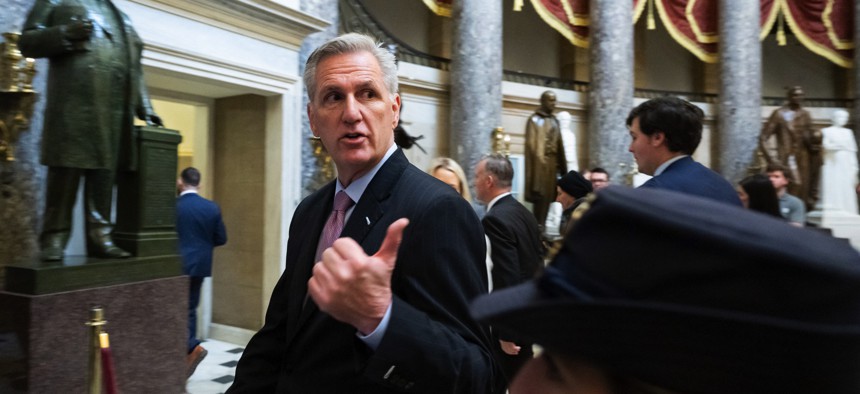Defense industry decries possible GOP-led spending cuts

US Speaker of the House Kevin McCarthy, Republican of California, leaves after holding a press conference in Statuary Hall at the US Capitol on January 12, 2023. SAUL LOEB / AFP
The Aerospace Industries Association begs lawmakers to avoid another sequestration deal.
Early efforts are beginning against possible Republican-led defense spending cuts as the clock ticks toward a fiscal showdown on Capitol Hill this spring.
On the same day the Treasury Department announced “extraordinary measures” to avoid defaulting on U.S. obligations, an influential trade association representing more than 300 defense and aerospace companies that employ 2.1 million workers called for a bipartisan budget deal.
“You, as our national leaders, must produce a budget that addresses fiscal concerns, while also protecting programs vital to our national security, the safety of our citizens, and U.S. global competitiveness,” Aerospace Industries Association CEO Eric Fanning wrote in a letter to Congressional leaders. “This will require careful analysis each year in the budget and appropriations process, rather than fixed and arbitrary budget caps that caused such turmoil and uncertainty during the years that the Budget Control Act was in place.”
Recent defense-budget increases have been widely supported by Republicans and Democrats, who cite a need to counter China and, for the past year, arm Ukraine to fight off Russian invaders.
But as the GOP-led House presses for spending cuts by refusing to allow payment for long-agreed expenditures, fears are increasing of a repeat of the sequestration deal enacted under the Budget Control Act of 2011. Defense officials have long said those mandated spending cuts reduced training, hurt maintenance, and severely damaged the military’s ability to respond to a conflict.
Earlier this month, House Speaker Kevin McCarthy, R-Calif., reportedly agreed to defense cuts in negotiations with a small group of Republicans who were blocking his election as speaker. On Sunday, McCarthy downplayed the size and scale of the mooted cuts on Fox.
“If we go back to [fiscal 20]22 levels, that was what we were spending just two or three weeks ago,” he said. “That’s not cutting defense by $75 billion.”
Just before Christmas, lawmakers approved an $858 billion defense budget for fiscal 2023—10 percent more than the $773 billion approved for 2022. Lawmakers said the increase was needed because of inflation and to replenish weapons sent to Ukraine.
Despite a stabilization of late, the effects of the pandemic are still being felt three years later: high inflation, supply-chain disruptions, and worker shortages, executives say.
“American families and businesses continue to struggle under very real and serious economic conditions like inflation, workforce difficulties, and ongoing supply chain disruptions,” wrote Fanning, a former Army secretary during the Obama administration. “Uncertainty emanating from Washington would exacerbate these already serious challenges.”
NEXT STORY: Textron appoints new defense tech segment leader


